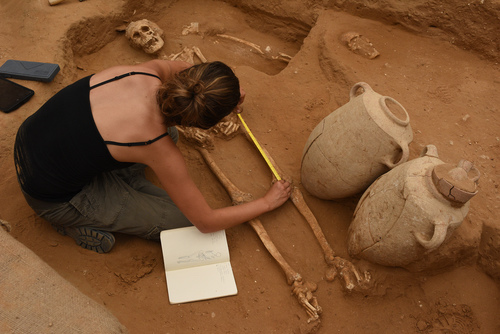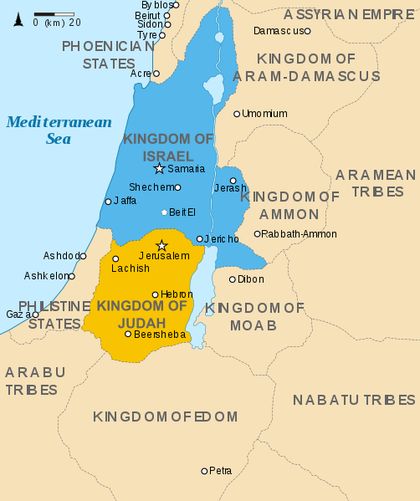A genetic study of the remains of an old cemetery confirms their Mediterranean origin, as the Old Testament says.
 Excavation in Ashkelon, a Philistine city. / Leon Levy Project
Excavation in Ashkelon, a Philistine city. / Leon Levy Project
The first DNA study recovered from an ancient Philistine site, has provided unique genetic information about the origins of one of the most famous Old Testament people.
The Philistines have a very strong presence in the Bible. They were one of the neighboring nations of Israel during the time of the Judges and Kings of Israel and Judah.
PHILISTINES, A DIFFERENT PEOPLE
Archaeologists agree that the Philistines were different from their neighbors: their arrival on the eastern shores of the Mediterranean, at the beginning of the 12th century BC is marked by a pottery wich is so similar to the one of the Ancient Greece; the use of an Aegean alphabet - instead of the Semitic - and the consumption of pork.
A study published last week in the journal Science Advances, prompted by the unprecedented discovery of a cemetery in the ancient Philistine city of Ashkelon on the southern coast of Israel in 2016, provides data on the genetic origins and legacy of the Philistines.
MEDITERRANEAN ORIGIN
The investigation seems to support its foreign origin, as mentioned in the Bible, but it also reveals that they soon married people from local populations.
The study analyzed the DNA of ten sets of human remains recovered from Ashkelon, which belong to three different time periods: a Middle/Late Age Bronze cemetery (between 1650 and 1200 BC), prior to the Philistine presence in the area; children's burials from the late twelfth century BC, after the arrival of the Philistines in the early Iron Age; and the people buried in the Philistine cemetery at the end of the Iron Age (10th and 9th centuries BC).
The researchers explained that four DNA samples from the early Iron Age, all from children buried under the floors of Philistine houses, proportionally include more “additional European ancestry” in their genetic signatures (almost 14%) than the pre-Philistine samples of the Age of Bronze (2% to 9%).
Although the origins of this additional "European ancestry" are inconclusive, the most plausible models point to Greece, Crete (which is mentioned in the Bible), Sardinia and the Iberian peninsula.
Daniel Master, director of the Leon Levy Expedition to Ashkelon, and co-author of the study, considers the results as “direct evidence” that supports the theory that the Philistines were immigrants from the West, who settled in Ashkelon in the 12th century BC.
“It fits with the Egyptian texts and others that we have, and it fits with the archaeological material” and the story of the Bible, he said.
 830 BC. Map / Wikimedia Commons.
830 BC. Map / Wikimedia Commons.
SHORT GENETIC SIGNATURE
Researchers were surprised that this specific “European blip” disappears quickly and is statistically insignificant in the study's DNA samples retrieved from the Ashkelon cemetery just a few centuries after the children's graves.
The later Philistine tombs have genetic signatures very similar to the local populations that lived in the region before the appearance of the Philistines.
“We managed to catch this movement of people coming to Ashkelon from southern Europe. Then it disappears very quickly within 200 years, probably because the Philistines intermarried and this kind of genetic signature was diluted within the local population”, said Michal Feldman, an archaeogeneticist at the Max Planck Institute and study co-author.
Despite the rapid genetic assimilation that the Philistines went through, they remained a distinct cultural group that was clearly identifiable from their neighbors for more than five centuries, until they were conquered by the Babylonians in 604 BC.
PHILISTINES IN THE BIBLE
In the book of Amos we read that the Philistines came from Caftor, that is, the island of Crete. This town took control of the coastal region, so that they are identified as a people of the sea.
The fact that the “exclusive” marks of their origin disappeared in time, coincides with the story of the book of Judges. In Samson's time there were clear social ties, since the famous judge of Israel even married a Philistine.
Later on, in the time of Samuel, the Philistines become military stronger and the confrontation with Israel went further, to the point that they captured the Ark of the Covenant.
Israel had a great victory against the Philistine army led by Goliath, which elevated the figure of the future King David, who throughout his reign won important victories over some Philistine cities.

Las opiniones vertidas por nuestros colaboradores se realizan a nivel personal, pudiendo coincidir o no con la postura de la dirección de Protestante Digital.
Si quieres comentar o